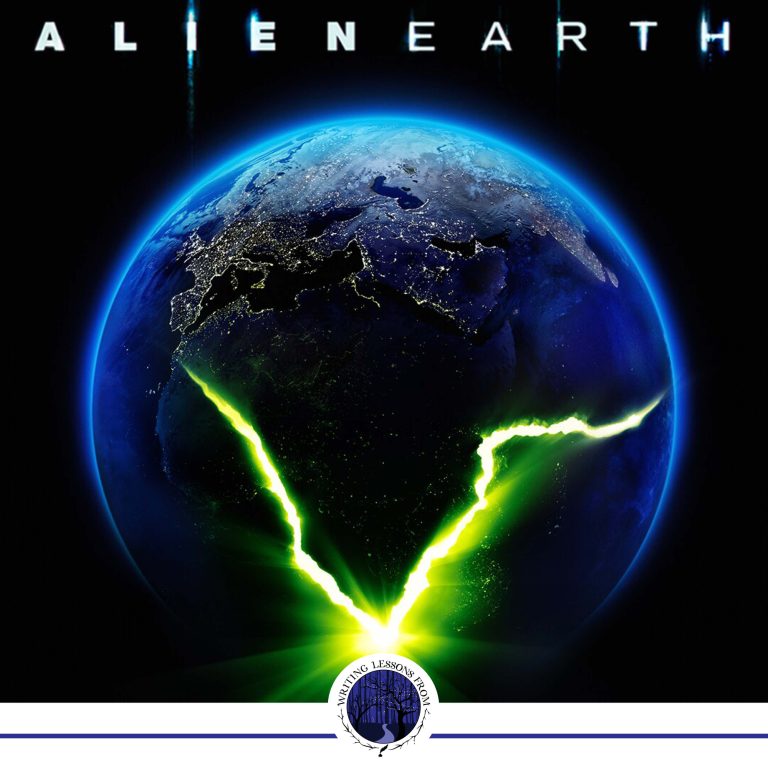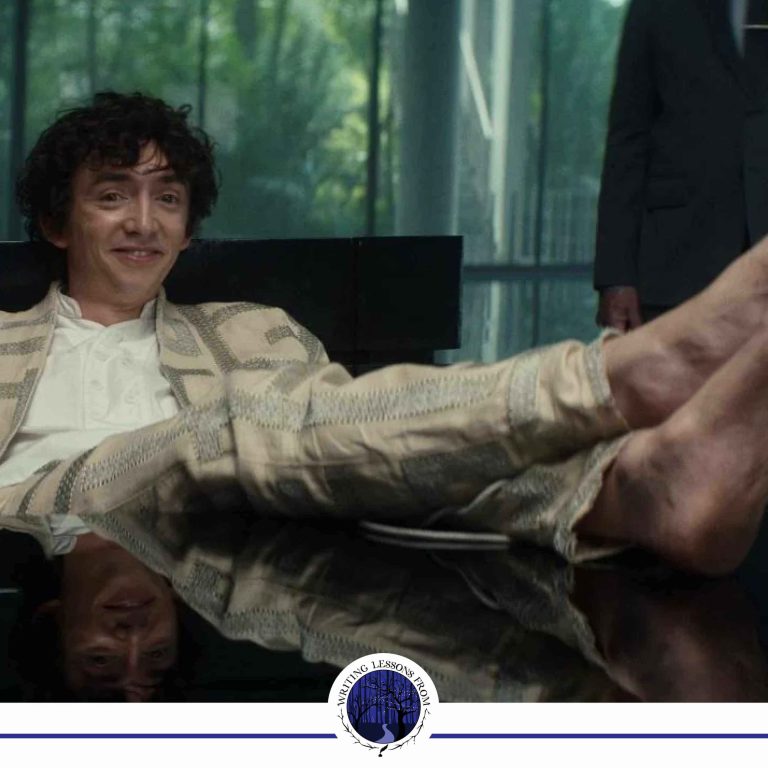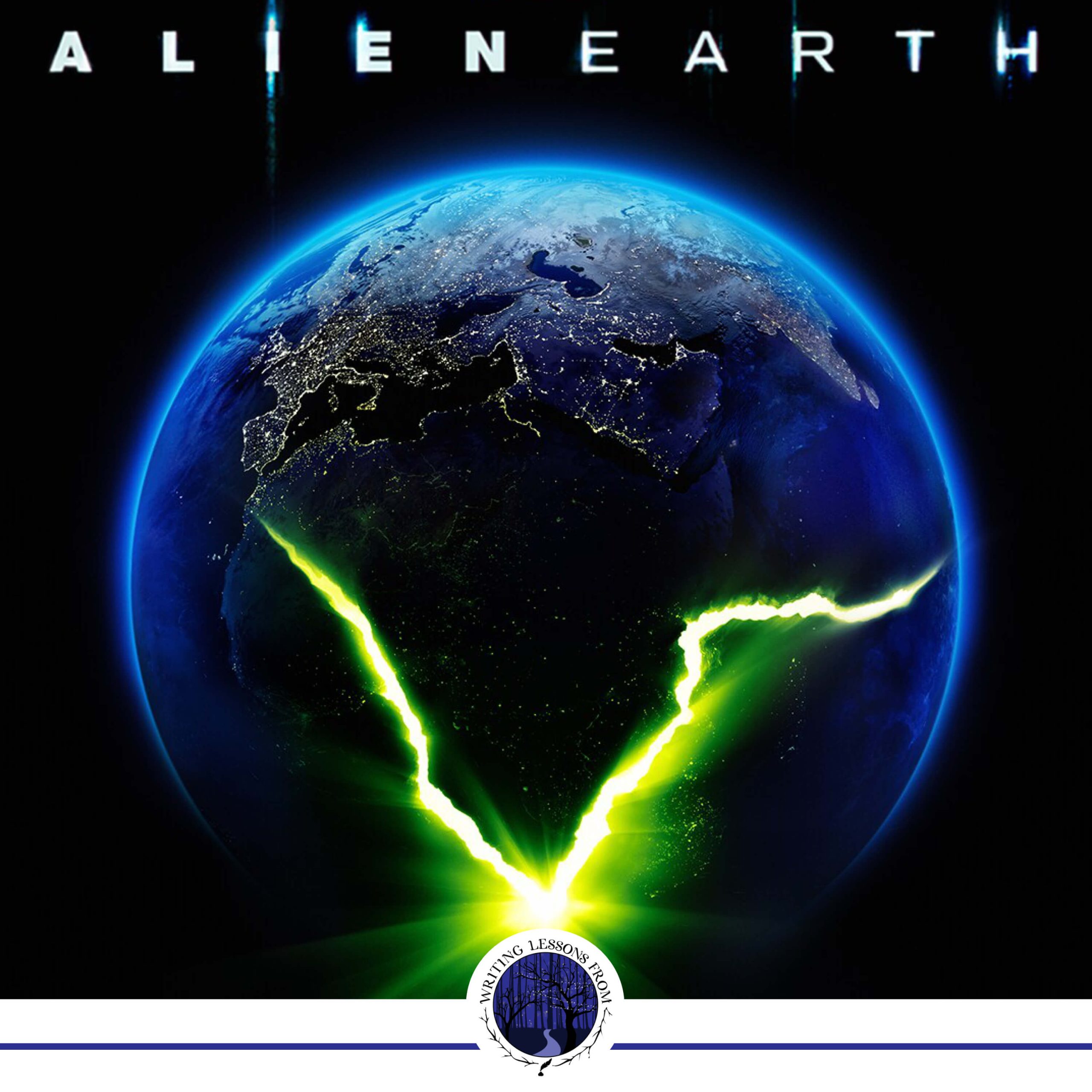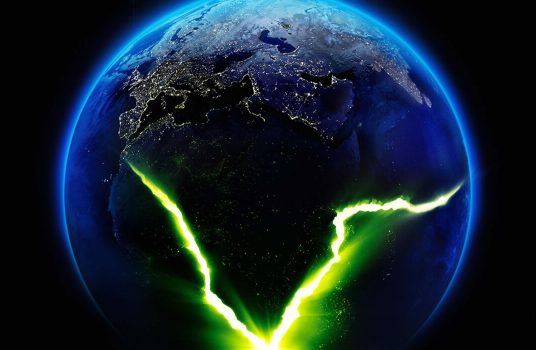Writing Lessons From... Alien: Earth aka Starting the Third Act Right
Listen to the blogcast of this episode:
To be a writer, to create art, is to create something that could one day bring comfort to a stranger.
In dark times, we often turn inwards to protect ourselves. Revert to things that bring us comfort, or discover something new and bury ourselves deep inside it.
Often it’s a film with the script memorised, a book with a cracked spine and crumpled pages, or perhaps a TV show on repeat.
Sometimes it’s a space horror, crash landed on Earth.
This is (so far) the longest episode of Writing Lessons From… because in dark times, I turn to worlds I can lose myself in. Right now, it’s Alien: Earth. And there’s just so much to talk about.
During the press tour for Alien: Earth, at a San Diego Comic Con panel with the cast, Timothy Olyphant, who plays Kirsch, declared that the show was a character study.
Yes! That’s exactly what Alien: Earth is. Want to know how to write interesting characters? How to write a cast of them that intertwine and carry a story?
You need to watch Alien: Earth.
I could write a thesis on the characters. I won’t. But I could.
It took me a while to figure out what I have learned from Alien: Earth that would fit into the Writing Lessons From… format.
Then I watched episode 6. The beginning of the third act. And I had a small epiphany.
Cue the incredible slow shot of the Alien: Earth letters coming into focus – a throwback to the original film – with ‘previously on’ shots and shots we can’t understand yet layered behind them with outlines of xenomorphs. Obviously, onwards, there are huge spoilers for Alien: Earth.
(Alien: Earth is available on Disney+.)

In the not-too-distant future, considering, democracy has failed (less on that the better) and the world is now divided and run by five corporations. Because, capitalism. One of those is Weyland-Yutani (the corporation that orchestrates everything in the Alien franchise) and another is Prodigy, led by the youngest ever trillionaire and genius, CEO Boy Kavalier.
Kavalier is busy fixing the pesky problem of death. A talented engineer, he’s built synthetics (the robots we all know in the Alien franchise) and is now turning his attention to creating a Hybrid, basically putting a human mind in the body of a synthetic.
His team tried it on adults: it didn’t work.
But it works on children. So, Prodigy have collected a group of terminally ill children, had their parents sign over their lives with the promise that their children will be saved, and, one by one, the children’s minds are put into the bodies of adult synthetics.
Why adults? Because synthetic bodies don’t grow.
There’s a huge Peter Pan theme running throughout this story. These children become the Lost Boys, led by the first child to transition, who names herself Wendy.
Around this time, a deep space research ship carrying five species of alien and lots of dead bodies, crashes into a Prodigy city. A Prodigy search and rescue team is sent in, including Wendy’s brother, Hermit, a medic, who doesn’t know his sister’s mind still lives.
It turns out Wendy has been tracking her brother. She convinces Kavalier to let her and the Lost Boys go in to ‘help’. And help they do, bringing Hermit and those five aliens back to Kavalier’s private island, Neverland Island, which, as we all know, is a horrible decision.
I could talk SO MUCH about the characters, how they’re portrayed, the relationships, the story arcs. IT’S ALL SO GOOD!
On to the writing lessons!
As with most stories, Alien: Earth has three acts. There are eight episodes, so by episode six, we’re entering the third act. The aliens are in the secured basement laboratories, Boy Kavalier is certainly very proud of himself, and no one has died yet (except all the people on the ship and in the building it crashed into).
It’s time something big happened.
But how?
I couldn’t quite wrack my brain as to how this would happen. Is the xenomorph they’ve purposefully grown just going to break free?
Maybe the eye midge will figure out how to unlock the cages?
Maybe Kirsch will turn on everyone!
(How good is Kirsch?! Did Kavalier programme in that dry humour or is that all Kirsch/Timothy Olyphant…)
To understand why I was impressed by what actually happened, you have to understand the hierarchy at Neverland Island.
At the top is Boy Kavalier, yes, but Kirsch is in charge of the lab. Kavalier cleverly put him in charge when he discovered the xenomorph’s parasitical start in life. Between them is Atom Eins (played by Ade Edmondson, who is amazing in such a scary, serious role – for the non-UKers among us, he’s a comedy legend!), carrying out Kavalier’s orders and acting as a sounding board and his right-hand man.
Three people in charge.
Nothing can go wrong in the lab, because Kirsch is there. Nothing can go wrong elsewhere because Atom Eins and Kavalier are watching.
But we need something to go wrong.
So, the creator, Noah Hawley, simply removed the three people in charge.
Sometimes the simplest ideas are the best ones.
Kavalier, Kirsch and Eins travel to presumably North America to meet with Weyland-Yutani and discuss the ownership of the ship and the aliens on board.
In doing so, they leave Neverland Island with no firm hand in control. Just a bunch of super-strong children, a handful of scientists and some clueless army people, oh, and those five species of alien.
On paper, this should be the weakest episode. It’s a way of starting the action.
And in other shows, this probably would be the weakest, most boring episode.
But something clever happened instead.
At the Weyland-Yutani and Prodigy meeting, we got to see another side of Kavalier. Gone is the joyful, charming CEO. Here we meet ruthless, clever Kavalier, the powerful CEO.
He walks in with dirty feet (he’s barefoot throughout the series) that he puts up in Yutani’s face. He doesn’t want to listen, he’s impatient, he talks back. And just when you think she’ll get the upper hand, being as clean and professional as she is, he throws the law back at her.
Does the moderator want to know why she’s so desperate to get her ship back? That’ll be the predatory, invasive species she’s brought here. Don’t believe him? That’s okay, he has pictures.
And sure, she can have her aliens back, but there’s a six-week quarantine period, so he best keep them until then.
You know, for the safety of the planet.
Boy Kavalier knows the laws, he’s planned this thoroughly. He plays Yutani and the moderator without missing a beat.
Why Morrow, the only survivor from the crashed ship, doesn’t speak up and point out that Kavalier is the reason the ship crashed, is anyone’s guess. Especially as Kavalier suggests that Weyland-Yutani crashed the ship on purpose, leaving Yutani somewhat speechless, which also suggests Morrow hasn’t mentioned Kavalier’s sabotage to her either. (That could be a plot hole, but I’m so in love with this series I’m going to ignore it.)
This is all part of Kavalier’s story arc, and it’s beautifully done. In episode one, we met a charming Boy Kavalier with good intentions, and while we could guess that he was a wrong ‘un just because of his wealth, we didn’t know for sure.
Over the episodes, that charm has drifted away, replaced with stern power and arrogance, and we see the true disruptor he is. If you watch carefully, you can also see his appearance changing over the course of the series – he’s looking more fractured, desperate, like he’s not sleeping.
And while Kavalier is throwing his weight around in another country, making what should have been a mind-numbing scene incredibly interesting, things are starting to fall apart at Neverland.
Poor Nibs is having her memories erased in an attempt to control and calm her, something that will lead to her snapping once more.
It’ll also be the catalyst for Wendy turning on Kavalier as she begins to realise they aren’t as free to live as they were told they would be.
Hermit is making escape plans, with the help with poor Arthur, which you know can’t end well.
The biggest shift in this episode?
Sweetheart Isaac, the passionate scientist to be, goes against Kirsch’s orders and ventures into the lab alone to feed the alien creatures and prove himself. Just like children do.
They’re so eager to grow up, so eager to prove themselves, but they don’t stop and think everything through.
Isaac breaks the feeding hatch door to one species, forgetting his own strength, and instead of calling for back up or help, he simply unlocks the door and attempts to slide the tray of food in without causing a mishap.
It comes as something of a shock that this species could kill a Hybrid. Nothing can kill a Hybrid. That’s what we’ve been told throughout Alien: Earth. These children are now essentially immortal. That’s the point of the product, right? Immortality.
The only clue we’re given as to Isaac’s fate is the food he puts on the tray for this particular species, the fifth species, the one we haven’t met yet.
The fly that eats minerals, metals… Hardware, motherboards…
My heart broke for Isaac, the child that just wanted to prove himself, and the first of the Hybrids to die. In fact, the first of our Alien: Earth cast to die.
But it had to happen, because at the beginning of the third act, something big needs to happen.
The flies are released into the lab, meaning Kirsch can’t step foot inside even if he was there to help. Instead, it’s Arthur that rushes to Isaac’s aid, after finding Slightly hiding outside the lab.
(Sorry, this is why this is so long. There’s so much to tell, to give context to everything!)
Slightly, of course, has other issues. He’s being blackmailed to take a human and expose them to the ovomorphs (the alien eggs holding the facehuggers). The egg will do the rest.
Once Arthur has rushed in after Isaac, all Slightly has to do is open the cage to the eggs and there you have it. One face hugger stuck on Arthur, hidden away by Slightly, one dead, one soon to be dead, and control is lost.
Not for long, of course.
Kirsch is watching all of this on his tablet and he doesn’t seem to want to bother the happy Boy Kavalier, even when Kavalier asks what’s wrong.
Order is restored, such as it is, by episode 7, when the adults have returned home.
But the damage has been done.
And actually, it’s not the aliens they really have to worry about.

ARGH! I love it so much. But what are the writing lessons?
The main lesson I took from episode 6 was a structural one.
Boring! I know. But also, important.
Whatever genre you’re writing, something needs to be happening at the beginning of act three to spark things off.
And, actually, it can in theory be boring stuff.
On paper, the three most powerful people go to a meeting in another country is not exciting. It doesn’t fill you with wonder.
It’s not until you build in the characters arcs and how those three characters are important to the running of everything that it starts to get exciting.
With Kirsch gone, Isaac is an unsupervised child in a dangerous environment. With Kavalier and Eins gone, Arthur has the space to give escape information to Hermit.
And because Kavalier is such a vibrant character, the meeting itself is also not a boring affair. It’s part of his arc, his changing demeanour. On a lesser note, so is Kirsch secretly watching the lab cameras and having a quiet conversation with Morrow in the lift (why was Kirsch there? It’s not like he popped to the toilet before they set off home!).
So yes, the writing lessons are structural, but more excitingly, episode six is a reminder that every scene, every writing decision, is an opportunity for character growth, to further your characters’ arcs, to add something else interesting, even if what they’re doing in theory is (snore) beaucracy-ville.
It’s also not what I was expecting.
I was expecting something explosive. An alien escaping, much death, shattered glass.
I was not expecting a board meeting and the illusion of control continuing somewhat.
And that’s what an Alien story is all about: control.
This is why it’s so hard to break down stories that are good.
There’s just too much going on. Yes, the writing lessons here are about structure, about using scenes to further develop characters, about not wasting opportunities.
But also, here comes the concept of themes again, of bigger messages, of one action having consequences elsewhere like ripples.
Like I said, I could write a thesis.
How on (Alien) earth do you begin to create something so complex?
It’s methodical. Boring, I know, but that’s the craft. The excitement doesn’t come from the building, necessarily. The excitement, for me, comes from the characters and the potential of what they can be and what they become.
That excitement, the characters, can make the most boring scene fascinating, and turn what could be boring into something magic.


